 |
 |





|

|
Dear visitors! I'm neither a critic, nor a writer, just a music lover. Besides, English is not my native language. So pardon if my style is not perfect. Still hope this information should be useful if you are already on this page!
The developing of rock music in Russia can't be compared with that in that in any other country.
The main reason for it is of course the "iron curtain" that existed in the USSR for 70 years.
But for the communist regime nobody would have known knows what music could come from Russia. However we have just
what we have. And I think, it's great!
Before that we had some good artists The first rock bands began to appear in Russia around year 1966 |
but their music was mostly a mixture of twist, jazz and pop. Well that's not our topic.
Late sixties saw several professional rock bands and lots of local the so called "amateur" bands, of
the latter most have disappeared but some became well known in the seventies. By the way the term
"rock" was nearly prohibited (the same is of course - "progressive", "psychedelia") and the definition
"beat" music and "vocal instrumental emsemble" was used instead of "rock" and a "rock band".
In the late sixties along with the official scene the underground music movement began to develop.
The main distinction from the official music was, unfortunately, poor istruments and sound quality however
compensated by the passion and free spirit of the musicians. Besides, the musicians said in
their songs all that could not be said from the stage. Well, it's a long story to tell and
the underground culture in the USSR may be a topic for a serious scientific work. You just had to live
in that country at that time to understand it. By the way many underground bands of the seventies
and eighties recorded their own albums. Of course, these albums were not pressed on vinyl. So they
spread all over the country as "magnetoalbums" - on cassetes and tapes. A lot of musicians were
judged for selling their recordings - as "unearned income".
The period between 1980 and 1985 is the time of so called "amateur" bands |
They were not allowed to record officially but could perform semi-official concerts somehow controlled by the authorities
and organised around "rock clubs". That time the difference between the official and "amateur"
(meant "underground") bands became more visible. The official bands were widely promoted,
recorded LP's, performed on big stages. But their music was too polished (except for maybe jazz
rock bands) and the lyrics in their songs were emasculated and empty. Needless to say these bands
were despised by the young generation. On the contrary, the underground bands were more free in
their creativity, playing and singing what they wanted. Some of these musicians worked as watchmen,
stevedores, stokers although many were highly educated... Here is the key to one of the important
features of the Russian rock music - dominating of the sense of the lyrics above the forms of music.
But of course every rule has its exception and there were lots of excellent bands that developed
their own original sound.
Pojuschie Gitary (The Singing Guitars) seem to be the first really ROCK BAND in the USSR. |
Pojuschie Gitary (The Singing Guitars) seem to be the first really ROCK BAND in the USSR.
The band was formed about 1966. The rumours began to spread around the country about some
"singing guitarrists".
That's where the band's name comes from. Pojuschie started with cover versions of beat bands like
Shadows and Tremeloes. But then they began to include local authors' compositions as well as their own ones. Their early
seventies songs bear similarities to Christie and Blue Mink. Their popularity was just enormous. They had
thousands of followers and established a new form called "VIA" - vocal instrumental ensemble. Most
of that "VIA" played some mixture of beat ant pop of better or poorer quality. But Pojuschie were the
first and undoubtely the best. Their heritage includes several EP's and a 10 track 10" self titled
mini-LP (1969) (all of them, especially the mini-LP are highly collectable and very hard to find).
In 1975 Pojuschie Gitary released the first Russian rock opera - "Orpheus And Eurydice" which was declared the most significant music event of the year.
Other bands of that kind were Golubiye Gitary (Blue Guitars), Sinyaya Ptica (Blue Bird), Tcvety (Flowers). I should also mention the bands like Gaya or Kobza, less known but having recorded some really good records. (Needless to say, one who finds a Gaya single or the LP of Kobza is a lucky one, they would be worth a lot!) Among these VIA were also Pesnyary but here starts another page of history.
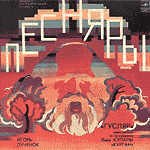
"GUSLYAR", Pesnyary
Own, absolutely unique sound. Not less than
nine piece band, they combined rock and folk music in a way no one had done before.
|
The first Pesnyary (discography) recordings date back to 1969 (now some are available on compilation CD's issued
in 1996). These were the cover versions of the Beatles with Russian lyrics. (Think that every
Soviet Union band passed such "Beatles cover versions" period in the beginning of the career).
But it didn't take long for Pesnyary to develop their own, absolutely unique sound. Not less than
nine piece band, they combined rock and folk music in a way no one had done before. Bjelorussian folk is
a specific music, very tender and melodical, filled with sorrow rather than with joy. Pesnyary
didn't just make rock arrangements of folk songs, they developed and enriched these songs at the
same time taking great care of the original passion and soul. One can find many elements of
psychedelia in their earlier works and progressive moves in the later albums. All their LP's are
highly recommended. Sadly, the Soviet music officials were not sleeping... All the bands of the
seventies had to include in their repertoire the songs by "official" writers and composers. But these
tracks, moving to pop in style, in Pesnyary's versions became massive hits and are popular even
nowadays. All the band members were the top class players and the vocal group was exceptional.
Using traditional folk instruments - horns, strings etc. (don't know how are they called in
English) combined with organ and electric guitar sometimes produced very psychedelic effect.
The first, self titled LP saw the light of day in 1971 (by the way the second and third albums were
as well self-titled, don't be confused!). I'm not sure what the public's impression was
(I was two years old then :). But still I have heard nothing of the kind although I have explored
a lot of 1970-ies Russian music. Maybe after Pesnyary the most interesting and sought after
folk-rock-prog band from the former USSR is Ariel.
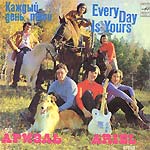
Ariel
"Kazhdyj Den' Tvoi (Every Day Is Yours)"
|
Ariel (discography) comes from the city of Tchelyabinsk, somewhere near the Ural mountains. From 1971 to 1974 Ariel
are rumoured to have recorded four of five albums that no one remembers now. 1974 is the year of
their breakthrough to the big stage. They played folk based music close to that of Pesnyary. But
their electric sound was more "pop rock-like" with some prog elements. The 1974 "Ariel" LP features
the eight minutes long "Otdavali Molodu" (Given In Marriage), a truly progressive track based on a
folk song that leaves no one indifferent. The second LP "Russian Pictures" (1976) is their most
"non-commercial" work with tasty folk influence, a must for prog fans tired of standard "progressive"
sound of the seventies. Three more LP's were recorded, by all means worth listening.
I should also mention their rock opera "Masters" dedicated to the tragic story of
the builders of the most beautiful church in Moscow. Sadly, no recorded copies of that program are
known to exist. Pesnyary and Ariel were the part of "official" culture and of the latter a few more
artists are worth mentioning here.
Alexander Gradsky, the conservatoire graduate and a professional singer, started playing
rock and beat in mid-sixties. (By the way he was one of the first musicians who tried to prove the
possibility of singing rock songs in Russian.) With his band
Skomorokhi (The Jesters) he released a rare 7" EP which can be described as the most progressive sound of the official music scene.
Rather representative track is "Ya - Goya" (I am Goya), the nervous, gloomy track with operatic still
sometimes screaming vocals. Since 1979 he "was allowed" (I'm not joking here - the
censorship in the USSR killed a lot of real talents) to record the LP's, first of them is called
simply "Russian Songs" - rather distinctive folk based progressive rock. The LP's that followed
were mostly synhesizers based. Still he loved to mix styles - this is shown heard on his every record.
Now I give a rest to my tired brains and give a word to the
real professional. Here's a short review of the 1980 LP: "This 2LP set opens with a stark Gabriel (ish)
track, with an ominous vibe. After a bit of psuedo 20's stuff, we move into riff heavy prog. Side
2 opens with a Jacques Brel type song, then goes into a mix of ballads and general rock, with a
twist!. Side 3 gets even more strange as horns come in on piano and guitar led songs that have a
faint jazz tinge. Side 4 begins with a folk type song, then an impassioned blues with some fluid
guitar. Weird trip and typical of the man." (Thank you, Ian Southworth and pardon me for stealing!). In 1987
Melodiya issued an LP containing the greatest work of Gradsky - "The Thoughts of a Jester" suite
recorded in 1971-1973.
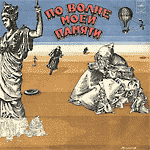
David Toukhmanov
"Po Volne Moyei Pamyati (On The Wave Of My Memory)"
|
The other mid-seventies "official" artist to be mentioned here is David Toukhmanov with his 1975
album "Po Volne Moyei Pamyati (On The Wave Of My Memory)". This multi-styled album is a kind of a
trip through the years based on lyrics by various poets of the past 20 centuries. A very original
work featuring vocalists of the leading USSR bands of that time as well as two orchestras,
certainly worth investigating.

Andrey Makarevitch
Machina Vremeni
|
Year 1969 was the year of birth of Machina Vremeni (The Time Machine). Undoubtly, they are still
number one Russian rock band, sill recording great albums. But here I mention them because in the
seventies they were the typical "in-between" rock band - on the one hand loved by all, especially
for the outstanding lyrics of Andrey Makarevitch. And on the oher hand they managed to enter the
official scene and produced records at the times when lots of other bands were in the underground.
Machina's style was just straight rock, sometimes - hard rock and rock'n'roll, later - with some
prog moments, finest of which was "The Little Prince" - a conceptual concert program performed in
the late seventies - early eighties. When I was a schoolboy I got one of those "underground"
bootleg tapes of that show. In 2001 a CD of this concert was pressed (probably from some restored bootleg tape).
I should say that Machina Vremeni always payed more attention to lyrics rather than to
musical forms although their playing was always powerful and remains such as this.
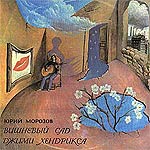 The first really psychedelic album was recorded - "The Cherry Garden Of Jimi Hendrix" by Jury Morozov
The first really psychedelic album was recorded - "The Cherry Garden Of Jimi Hendrix" by Jury Morozov
|
OK, year 1973 for me is a year when the first really psychedelic album was recorded (at least it reached our times and the tapes were saved).
I mean of course "The Cherry Garden Of Jimi Hendrix" by Jury Morozov.
Yury recorded this LP having locked himself up in his flat for two months. He played all the instruments himself
(often simultaneously with his hands and feet). In style this is a unique blend of psychedelia
and progressive rock. During the years that followed Morozov recorded dozens of albums.
The best were issued on vinyl 10 - 15 years later. Among them the best are "Idioteque", "Blue Star
Wanderer", My Light, My Angel".
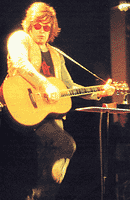 The Aquarium albums are out of time, I mean that you can't determine the year of the recording, they just belong to the era, not less.
The Aquarium albums are out of time, I mean that you can't determine the year of the recording, they just belong to the era, not less.
|
The living and still performing legend of the Russian underground rock is Aquarium (Boris Grebenschikov). They made their
first recording in 1973, some more album attempts followed and in 1980 they met Andrey Tropillo who
produced their first "golden" album - "The Blue Album". After that Aquarium recorded several albums
that now may be considered as the quintessence of the Russian underground. Here they are:
"Electricity"(1981), "Triangle"(1981), "Acoustics"(1982), "Taboo"(1982), "Radio Africa"(1983),
"Ihtiology"(1984), "The Day Of Silver"(1985), "December's Children"(1986), "Equinox"(1987).
They tried almost every style - from reggae to T.Rex-like weird folk, from new wave to meaty
electric blues, from progressive back to folk rock. The Aquarium albums are out of time, I mean that
you can't determine the year of the recording, they just belong to the era, not less. A lot of great
musicians played in Aquarium
including Sergey Kuryokhin, the world famous jazz & avant-garde piano player. In the 1990-s they
recorded in England & USA with the help of Dave Stewart and members of The Band to name a few.
Their music was influenced by T.Rex and Jethro Tull, Talking Heads and Grateful Dead,
King Crimson and The Rolling Stones, Pink Floyd and Captain Beefheart, Zappa and
Gentle Giant. Each album has its unique sound. Aquarium leader Boris Grebenshikov is among the
best rock poets ever, equal to Dylan, Ian Anderson and Lennon. Fortunately, all of the significant
Aquarium works were saved and are available now on CD's.
Year 1980 is the year of the first big rock festival in the USSR. And the last one.
The Olympic Games opened several doors to official scene for some underground bands but
unfortunately it did not last long... Anyhow this festival did its job - the Aquarium show for
example shocked the judges. Besides this festival shhowed to the public that there were really
good art rock bands (as Avtograf), jazz rock (as Gunesh). And it also marked the peak of the career
of Machina Vremeni. A double vinyl record was issued soon that presented the studio tracks by the
best bands who took part in the festival but of course Aquarium was not included. Unfortunately the live show
itself has never been issued although some fragments on video recordings of bad quality can be found.
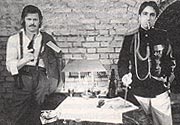 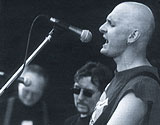 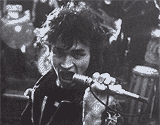 |
| Grebenschikov - Kuryokhin |
Strange Games |
Kino |
The early eighties rock in Russia to me is assosiated first with the Leningrad Rock Club.
It was an
official authorities attempt to somehow control the rock movement. But the "amateur" bands (that
were really professional in fact) didn't miss their chance. The best rock bands concentrated around
the Rock Club and used the opportunity to play concerts and record albums (although these albums
were available on bootleg tapes only before getting the official releases in late eighties -
nineties). The greatest was of course Aquarium and some more are worth mentioning. Others were
Zoopark (the best rhythm and blues band of that time), Strange Games (avant-garde), Alice, Televisor
(hard new wave), Tambourine (soft folk rock), Secret (beat, rock'n'roll), Nol (folk, punk, pub
rock), Kino (romantic rock) to name a few. By the mid-nineties the Rock club almost ended its activity.
TO BE CONTINUED...
|
|
|
|
Home
History of Rock in Russia
Discographies
Russian vinyl, labels
Links
|
|
|
|